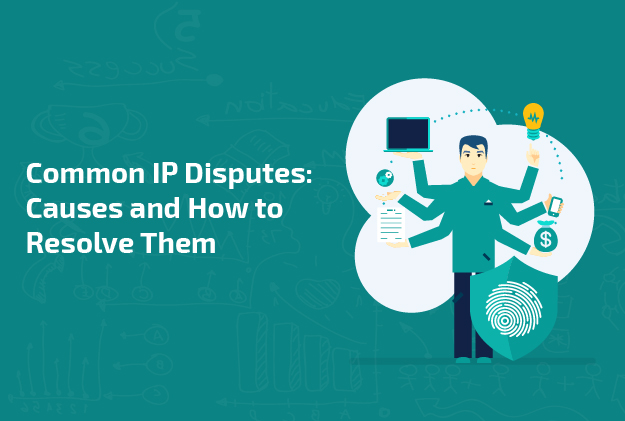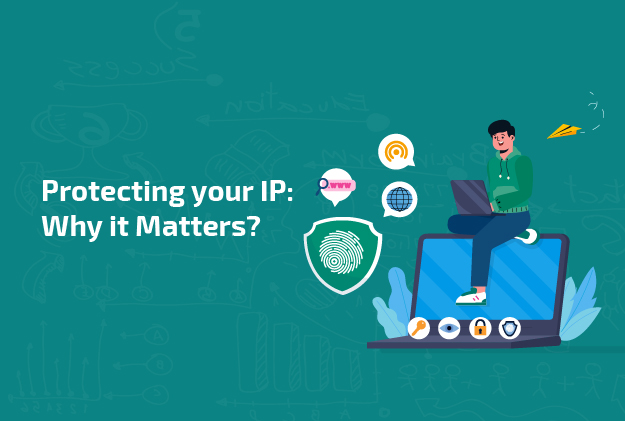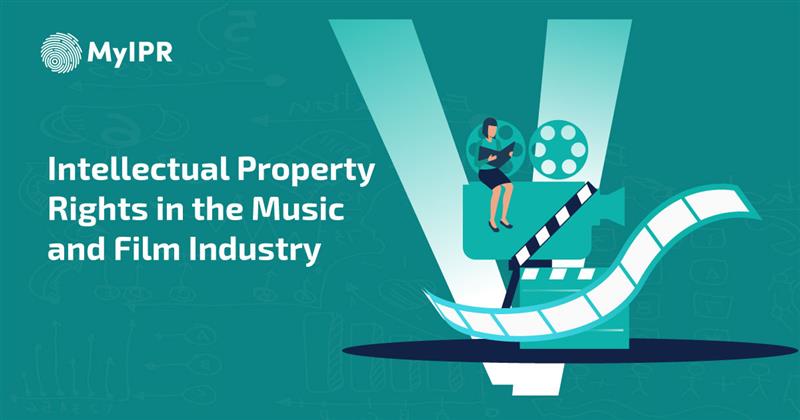
Recently, major record labels such as Universal Music Group and Sony Music have filed lawsuits against AI companies, including, Suno and Udio. The reason for the lawsuit is the violation of copyright statutes by these companies as they used copyrighted music to train their system without the consent of these record labels. However, these companies are rubbishing these claims. The incident sheds light on the incident of copyright infringement in the music and entertainment industry. Further, with emerging technologies like AI, it has become more crucial than ever to protect intellectual property rights in the music and film industries. In this blog post, we will learn about the significance of intellectual property in the music and entertainment industry, steps for copyright registration, and anti-piracy protection for the film and music industry.
Significance of IP Rights in Music and Film
Protecting Intellectual Property
Intellectual property rights (IPR) like copyrights, patents, trade secrets, and trademarks protect not just the music and film industry but also safeguard their components for both economic growth as well as creative protection.
A. Copyrights: They protect the core elements of the entertainment industry and grant the creator exclusive rights over their creations like story, lyrics, music, and others. Copyright provides artists with the right to control how their music, films, and their essential components are used, reproduced, and distributed.
B. Patents: They can protect any technological innovations in film production and music such as pieces of equipment, software, and special effects.
C. Trademarks: They can protect the brand names, logos, signs, symbols, and slogans that differentiate them from other brands. Trademarks in film and music aid in building brand identity and consumer loyalty.
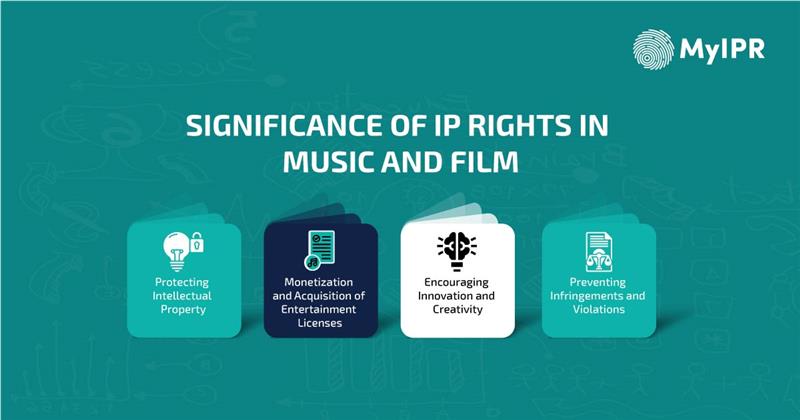
Monetization and Acquisition of Entertainment Licenses
Intellectual property rights help artists and filmmakers monetize their works via means of licensing, royalties, merchandising, revenue distribution, and earnings from digital platforms as well as television broadcasts.
Encouraging Innovation and Creativity
IP rights ensure that creativity in the film and music industry remains protected from any infringements, violations, plagiarism, or any kind of unauthorized use. This helps in establishing a safe and secure environment that encourages the budding up of new projects alongside unique content in the industry. This motivates not just producers, but also filmmakers, musicians, writers, lyricists, and artists to engage in different and exceptional projects.
Preventing Infringements and Violations
Piracy in the music industry as well as in the film industry remains one of the key challenges alongside, plagiarism, and infringement. These violations can erect significant issues like loss of revenue, mental strain, and hurdling further creative works. IPR (Intellectual Property Rights) protects music and films from these issues and safeguards the interests of creators and filmmakers.
Anti-Piracy Protection for Music Artists and Film Studios
There are several approaches that can be used by music artists, filmmakers, and studios to protect their creative works and other essential elements. Here are a few anti-piracy protection measures for music artists and film studios:
Digital Rights Management (DRM): Implementing DRM technology can protect the IP in music and film by restricting them from being live-streamed, piracy, and any other unauthorized use.
Watermark Technology: Digital watermarking technology helps in the prevention of unauthorized use and tracking of copyright infringements as it incorporates source tracking codes.
Regular Audits: Regular audits can verify the potential vulnerabilities, alongside adherence to IP rules and regulations, minimizing infringements and violations.
Content Evaluation: Content evaluation is crucial through using several automated tools, to prevent illegal distribution and infringements.
Licensing Agreements: The licensing agreements should be clear, making the terms and conditions clear. It highlights rules for using and distributing content, safeguarding creators’ rights.
Blockchain Technology: By leveraging blockchain technology, filmmakers and artists can keep track of ownership and distribution rights of their content.
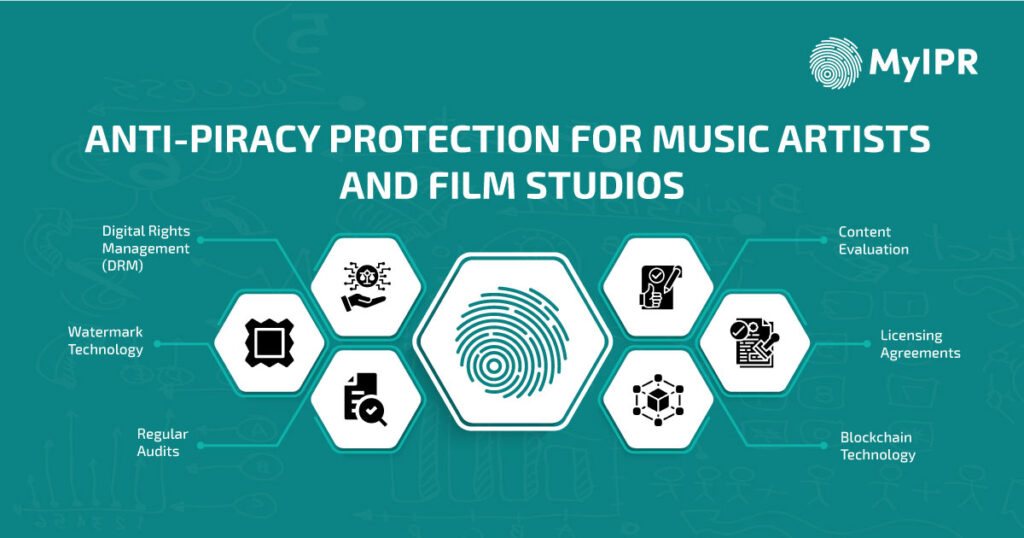
Another crucial approach can be copyright registration for filmmakers, musicians, and artists for the protection of their content.
Steps for Copyright Registration
1: Preliminary Search: It helps in tracking similar copyrighted works.
2: Applying for Registration: It includes submission of the works and required documents including, NOC (No Objection Certificate) and proof of identity.
3: Payment for Registration: Pay the specified amount for the registration.
4: Diary Number Generation: Obtain the dairy number that helps track the application.
5: Formality Examination: In this step, the application undergoes a formal evaluation for compliance with copyright requirements.
6: Mandatory Waiting Period: During this waiting period, any third party can object to copyright infringement.
7: Hearing (In case of Objection): In case of any objections, a hearing can be conducted for both the parties involved.
8: Final Review: In case of no objection or hearing results in favoring the applicant, the Registrar carries out the final inspection.
9: Certificate Issuance: After successful completion of the final inspection, the Registrar grants copyright registration and generates a copyright certificate offering legal protection for the work.
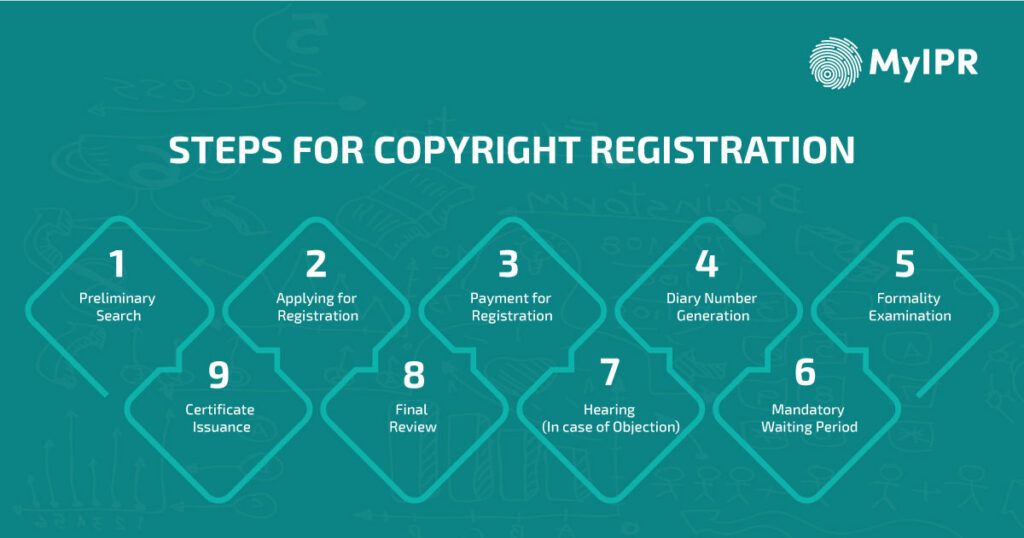
Copyright protection helps in resolving IP disputes and protecting intellectual assets. However, it is not easy to gain an IPR including copyright as the process itself needs some legal requirements and document verification. There comes MyIPR as your savior to protect and safeguard your business endeavors and successive innovations.
MyIPR is designed to mitigate the issues of plagiarism, theft, and misuse of creative ideas. It is a user-friendly application that provides a smooth certification process. This certificate acts as primary evidence that can facilitate the IPR and can be used in case of any feuds or allegations. Blockchain technology offers a robust solution by securely collecting and timestamping evidence of IP creation, making MyIPR a secure platform for creators and businesses to commence their creative ventures in a safe environment. Besides, MyIPR has been molded with an advanced algorithm that can detect the similarities among the different ideas; it can further shrink the chances of the coincidence of double discoveries or processing similar ideas.
Final Reflections
In conclusion, recent lawsuits and rising conflicts among the industry giants outline the rising cases of IP infringements and violations. These instances in the film and entertainment industry can cause severe revenue loss and result in mental strain on the creators and filmmakers. Filmmakers and artists can utilize intellectual property rights to safeguard their creative works. Filmmakers and artists can leverage technologies like blockchain, and DRM, and conduct regular audits to further strengthen IP protection. Strong IP protection can help in creating revenue generation and licensing the creation for further benefits.
Further, platforms like MyIPR which is backed by blockchain technology, present users with a secure ecosystem with agreeable features like accessibility, affordability, monetization opportunities, and a secure environment.
FAQs
What are Intellectual Property Rights (IPR) in the music and film industry?
Intellectual Property Rights (IPR) in the music and film industry refer to the legal protections that allow creators, including musicians, filmmakers, and other artists, to protect their creative works from infringements and violations.
How do copyrights protect music and films?
Copyrights grant creators exclusive rights over their works, namely the right to reproduce, distribute, perform, and adapt their music or films.
What is the role of trademarks in the music and film industry?
Trademarks protect brand names, logos, and other elements that distinguish their work from others, such as album titles, film titles, or artist names.
How can artists and filmmakers monetize their intellectual property?
Creators can monetize their intellectual property in multiple ways like licensing their music or films and revenue generation from advertisements, merchandise, streaming platforms, or television.
What are the consequences of copyright infringement in the music and film industry?
Copyright infringement can lead to legal disputes, financial penalties, and a loss of revenue for creators.



